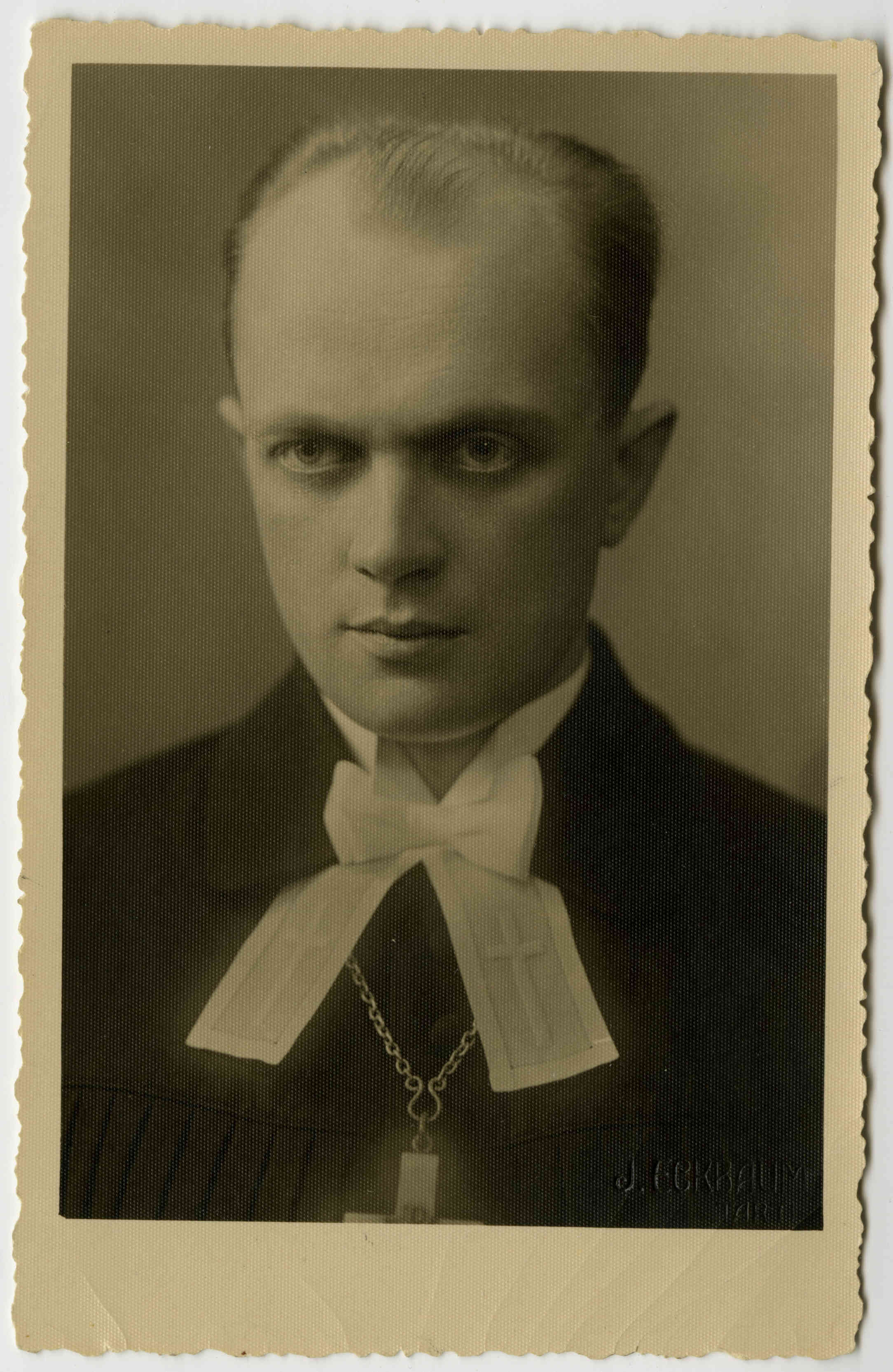
Harri Haamer
Harri Haamer (also Harry Haamer, 8 July 1906 – 8 August 1987) was a pastor, writer and cultural historian.
Haamer was born in Kuressaare in Saaremaa Island as the son of an official. From 1914–1918, he attended Alexey and German gymnasiums and from 1918–1924 Saaremaa Coeducational Gymnasium, all in Kuressaare. From 1924–1929, he studied theology at the University of Tartu. After ordination, Haamer worked from 1929–1933 as pastor of Püha congregation in Saaremaa, from 1933–1948 of Tartu St Paul’s and from 1955 to his death of Tarvastu congregation. From 1929, he was the first secretary for youth work at the Estonian Evangelical Lutheran Church and one of the ideologues of the Boy Scouts movement. From 1933–1938, he edited the magazine Meie Sõber and published numerous articles on the Boy Scouts movement.
Although Harri Haamer did not serve the German occupation forces during World War II, the Soviet authorities punished him with deportation to Siberia in 1948, as he refused to obey the order to stop teaching the Christian message to young people. From 1948–1954, he was in forced labour camps in Siberia, from 1954–1955 in banishment. From 1962–1970, Haamer worked as lecturer of Old Testament and Semitic languages at the Institute of Theology of the Estonian Evangelical Lutheran Church. He was dismissed from this post on the demand of KGB.
Harri Haamer made his debut in print in 1925 and, from that time onwards, published articles, short stories, memories and spiritual reflections. Haamer’s first book was the short monograph Rudolf Kallase elulugu (‘Biography of Rudolf Kallas’) published in 1929. He has written numerous ethically wakeful children’s and youth books most of which he illustrated himself. Part of them were translated into German and prepared for publishing in print in Germany by Haamer’s colleague, pastor Gustav Haller who emigrated from Estonia in 1939. Haamer has also published collections of sermons. Some of the children’s books and spiritual texts remained in manuscript.
Harri Haamer’s memories of Siberia appeared posthumously in 1993 under the title Meie elu on taevas (‘We Shall Live in Heaven’). The book has also been published in Finnish, Russian, German and English. The book reveals the author’s philosophical look at the contradictions between power and spirit.
L. P. (Translated by I. A.)
Books in Estonian
Sermons
Tema käsi: pühade mõtteid. Tartu: Tartu Pauluse koguduse I pihtkond, 1934. 144 lk.
Seitse palvet. Stockholm: Eesti Vaimulik Raamat, 1980. 16 lk.
Avatud taeva all. Tallinn: Logos, 1998. 469 lk.
Mu südames on ülestõusmine. Tallinn: Logos, 2002. 532 lk.
Youth work
Vabaduspäevaks: XVI. Tartu: Tartu Skautide Malev, 1934. 31 lk.
15 aastat skautlikku noorsootööd Saaremaal. Mõtteid ja tagasivaateid. Kuressaare: Saaremaa Skautide Malev, 1936. 27 lk.
18. Eesti karskuskongress: Tallinnas 13. ja 14. juunil 1936. a. Tartu: Eesti Karskusliit, 1936. 31 lk.
28 aastat skautlust Eestis. Tartu: Tartu Skaudisõprade Ühing, 1939. 63 lk.
Sinule!: tunnistusi noortele. Tartu: Tartu Pauluse I Kogudus, 1940. 66 lk.
Tartu Pauluse I koguduse jõulutervitus lastele 1943. Tartu: Postimees, 1943. 15 lk.
Memoirs
Meie elu on taevas. Siberi mälestused. Tallinn: Logos, 1993. 205 lk.
Children’s stories
Vanaema inglilaul: seitse juttu lastele. Tallinn: E.E.L.K. Noorsootöö Keskus, 1937. 48 lk.
Jeesus kutsub: seitse juttu lastele. Tallinn: EELK Noorsootöö Keskus, 1938. 48 lk.
Pilk päikesesse: kuus juttu lastele. Tallinn: EELK Noorsootöö Keskus, 1938. 46 lk.
Ester: jutt ühest väikesest tüdrukust. Tallinn: EELK Konsistoorium, 1943. 39 lk.
Naatani lood. Tallinn: Varrak, 1992. 28 lk.
Laste lood. Imavere: Shalom, 2006. 183 lk.
Monographs
Rudolf Kallas. Tallinn: Eesti Kirik, 1929. 53 lk.



